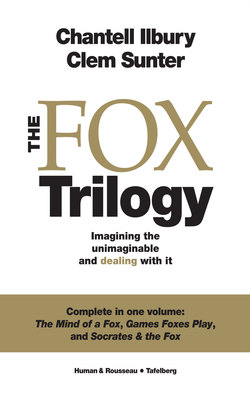The Fox Trilogy

Реклама. ООО «ЛитРес», ИНН: 7719571260.
Оглавление
Chantell Ilbury. The Fox Trilogy
Foreword
Eye of the tiger or fox of the fairway?
Two boardroom species
A lesson from Mother Nature, flying frogs and sea-foxes
A philosophical interlude and moment for introspection
Tiger and the Titanic provide clues
Our foxy matrix
Memories of the future
SWOT – a nuts and bolts explanation
The principle of irresistible temptation and tobogganing in the dark
Rules of the game
Key uncertainties
Scenarios
Options
Decisions
The matrix in action
Crouching Tiger, Winning Fox
Postscript
I Can’t . . . or Can I?
Anyone for a game?
Straight talk about strategy
The power of the spoken word
Rimless wagon wheels versus circles
Foxes versus hedgehogs
Dots in space versus games
The Conversation Model
The scope of the game
Players
Rules of the Game
Key Uncertainties
Scenarios
SWOT
Options
Decisions
Measurable Outcomes
The Meaning of Winning
Full House
PROLOGUE. 1 Socrates: A Brief History
2 The Legendary Dialogue: Socrates & the Fox
3 The Conversation Model: Our Version of the Socratic Method
DEFINING THE GAME. 4 Context: How has the game in your industry changed, where is it heading and how have you fared as a player?
5 Scope: What is your playing field today, and how do you want to expand (or contract) it in light of the developing context and the resources at your disposal?
6 Players: Who are the players that can most advance or retard your strategy, and how should you handle them in future?
7 Rules: What are the rules of the game that are likely to govern your strategy under all scenarios?
8 Uncertainties: What are the key uncertainties that could have a significant impact on the game and divert your course either positively or negatively?
9 Scenarios: On your gameboard, what are the possible scenarios and where would you position yourself in relation to them now?
PLAYING THE GAME. 10 SWOT: What are your strengths and weaknesses as a player; and what are the opportunities and threats offered by the game?
11 Options: Within your span of control, what options do you have to improve your current performance and longer-term prospects in the game?
12 Decisions: Which options do you want to turn into decisions right now, and what is the initial action associated with each decision?
13 Outcomes: What is your meaning of winning the game in five years’ time, expressed as a set of measurable outcomes?
EPILOGUE. 14 From Socrates to Wack: Looking Forward and Looking Back
Отрывок из книги
Imagining the uninmaginable and dealing with it
Human & Rousseau / Tafelberg
.....
Over time, the spider web changes shape and position. What was acceptable yesterday is no longer acceptable today. For many years in Italy, company directors oiled the wheels of the state’s bureaucracy with lavish bribes. It was the done thing. Suddenly the tide turned after the intervention of an aggressive magistrate; and many a financial director of ill-illustrious company was left high and dry, gasping for air on the beach as his colleagues abandoned him. On a wider scale, think back to the Romans. They offered nations around them a simple choice: either volunteer to be part of the Roman Empire or be annihilated by our legions. This brutal principle of empire-building stood until the middle of the last century. But then the rule changed and invasions were no longer allowed. Iraq’s Hussein and Serbia’s Milosevic were caught in the web. Now the web is closing in on dictators suspected of torturing and slaughtering their own citizens in large numbers, as well as those who siphon the nation’s wealth into their foreign bank accounts. In Roman times, CNN wasn’t around to film what the legions did to subjugate other nations. Now, the victims of a Western bombing raid on Baghdad are interviewed in their hospital beds. To television viewers, strong-arm tactics are unacceptable if innocent victims are a visible consequence.
In the world of commerce and industry, “corporate governance” is not just a buzz word. It is a new piece of the spider web, changing the rules of the game about how a company should be run. The positions of chairperson and CEO should no longer be vested in the same individual, as this concentrates too much power in a single pair of hands. For the sake of checks and balances, the chairperson should be non executive. The major subcommittees of the board of directors should also be chaired by non executive directors. Companies should issue reports on their performance in areas such as safety, health and the environment, as well as ones describing their social responsibility programmes. The traditional annual report is not comprehensive enough.
.....